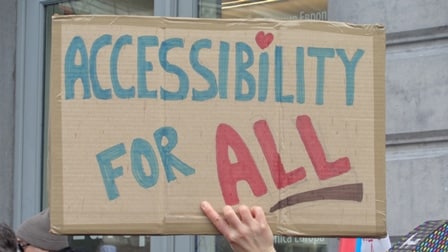
A new legislation under preparation
Yet, while many EU Member States already have some form of accessibility legislation, there is currently no law on accessibility at European level, and therefore no accessibility requirements for products and services circulating across EU countries.
End of 2015, to implement the UN Convention on the Rights of Persons with Disabilities (UN CRPD) ratified earlier by the EU, the European Commission tabled a proposal for a European Accessibility Act, a directive to harmonize legislation on accessibility in the EU.
If the European Accessibility Act is adopted by the European Parliament and the Council, it will set common binding EU accessibility requirements for certain key products and services. Its objective is to make products and services more accessible for older people and people with disabilities, while leading to cost reduction for companies.
AGE welcomes the great potential of this legislative proposal which covers mainly:
- Smartphones, tablets and computers
- Ticketing machines and check-in machines
- Televisions and TV programmes
- Banking and ATMs (Automated Teller Machines)
- E-books
- Online shopping websites and mobile applications
However, we believe that the scope of the European Accessibility Act should be extended to more products and services and most importantly to the built environment (namely: human-made infrastructures supporting human activity, such as buildings, roads, parks, etc.) in order to bring a real improvement in older people’s lives.
Our joint action for a stronger Accessibility Act
From the start, AGE has decided to work on this dossier in close collaboration with the European Disability Forum (EDF) and ANEC (the European association representing consumers in standardization).
Together we sent a joint letter to call on the European Parliament (EP) to adopt a more ambitious position. The European Parliament is currently discussing the Commission’s draft proposal on the basis of a draft EP report, which is unfortunately not supportive of mainstreaming accessibility and is even watering down the Commission’s initial proposal.
On 6 March, we participated in a demonstration, led by the European Disability Forum (EDF) in front of the European Parliament and some NGO representatives and a large group of about 50 people with disabilities joined the meeting of the Committee on Internal Market and Consumer Protection (IMCO Committee), which is the responsible Committee for the European Accessibility Act in the European Parliament.
Read here our article on this demonstration and here our joint press release sent on that occasion + add link to our article on Pay-ABLE
You may also read here EDF Leaflet on the Accessibility Act, available in 23 languages
In addition to that, AGE has also joined the Pay-ABLE platform which focuses on barrier free access to payment terminals for everyone in Europe. The platform advocates for the inclusion of payment terminals in the scope of the European Accessibility Act (they are not covered by the current proposal).
Standardisation: a critical tool for accessibility
Accessibility is intrinsically linked to standardization. Coherent common standards are a powerful instruments to ensure accessible products, services and facilities that actually meet people’s needs. For that purpose, end-users of those products, services and facilities need to be involved in the design of accessibility standards.
AGE has been working along with European Standardisation Organisations, such as CEN and CENELEC, as well as with ANEC on accessibility standards for some years and work is advancing at EU level. In the field of new technologies, AGE seeks to bring the perspective of older people through its involvement in the European Multi Stakeholder Platform on ICT Standardisation, an advisory expert group on all matters related to European ICT standardization, and in the Strategic Advisory Group on Accessibility that is responsible to include “Design for All” in relevant European standardisation initiatives.
On the research side, AGE is part of the EU-funded PROGRESSIVE project, focusing on standardisation needs in the field of information and communication technologies (ICT) for active and healthy ageing. The aim of this two year project is to identify standards that support the development of ‘age-friendly’ communities, facilities and ‘smart homes’ as well as to explore the way older people’s voice can be heard more efficiently in the standardisation process.
The potential of standardization in supporting active and healthy ageing is covered in a comprehensive way in the March-April edition of the ISO Focus, the bi-monthly magazine of the International Organization for Standardization (ISO).
In addition to our involvement in working groups on ICT standardisation, AGE is also part of other advisory groups working on accessibility which offer us an interesting opportunity to echo older people’s needs on specific issues. Those groups are:
- Design For All Working Group of the European consumer voice in standardization (ANEC)
- Financial Services User Group (FSUG) of the European Commission
- Working group on contactless payments and on instant payments of the Euro Retail Payment Board of the European Central Bank.
- Working group on Technical Specification on Interoperability of the European Railway Agency.
To read more on AGE work on accessibility, you may refer to this page which reports on AGE work in that area contact Julia Wadoux, julia.wadoux@age-platform.eu






